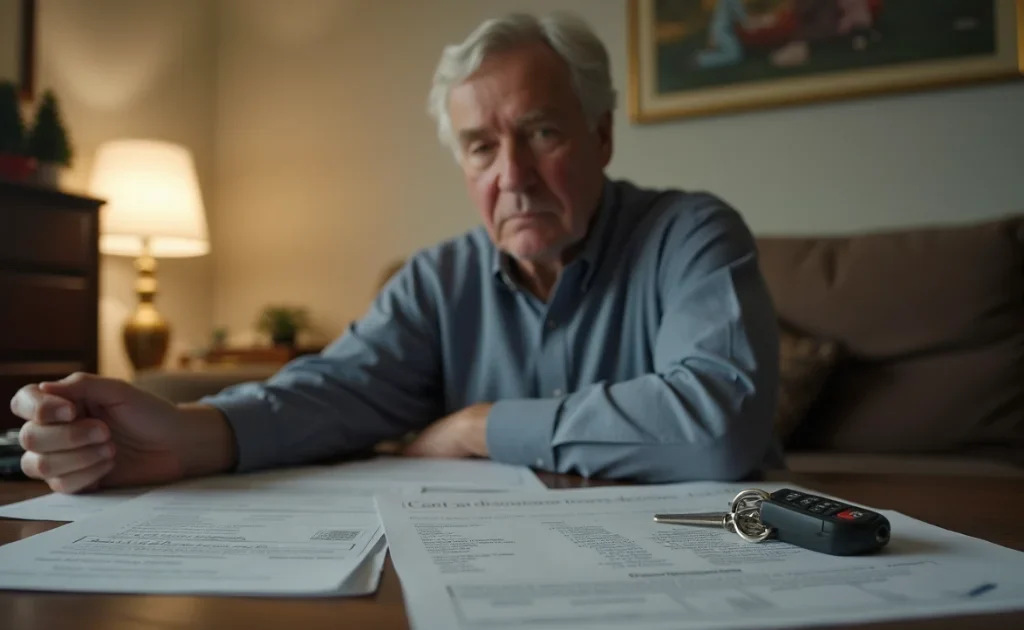Car Insurance for Car Owned by Estate :
Losing a loved one is one of the most emotionally taxing experiences you may go through. During this challenging time, amidst the grief and the paperwork, you might find yourself faced with the practical task of dealing with the deceased’s assets. If the estate includes a vehicle, understanding the nuances of car insurance for an estate-owned car becomes essential. It’s a small but crucial detail that ensures the vehicle is properly protected, whether it’s actively used, parked, or about to be sold.
In this article, we’ll guide you through everything you need to know about car insurance for a car owned by an estate, from how it works to the different insurance options available, and why it matters for you and your loved one’s assets.
What Is Car Insurance for a Car Owned by an Estate ?
When someone passes away, their belongings—such as cars—become part of the estate, which is managed by an executor or administrator. The car becomes an estate asset, and its insurance needs may change, depending on whether the vehicle is being used, stored, or sold. While insurance may not be at the top of your list when handling estate affairs, it’s essential to ensure the vehicle is properly insured to protect its value and any potential liabilities.
Why You Need Car Insurance for Estate-Owned Vehicles
If you’re the executor or an heir of an estate, understanding the importance of keeping the vehicle insured is key. Here’s why:

Protecting the Value of the Vehicle
Even if the car is not being driven, it may still be at risk for damage, theft, or vandalism. Whether the vehicle is a family heirloom, a collector’s item, or just a car that has sentimental value, ensuring it’s properly insured protects its value during the estate administration period. You may also be responsible for covering the car’s repair costs if it’s damaged while sitting idle.
Compliance with State Laws
In most states, you’re required to keep car insurance on any vehicle that’s legally registered, even if it’s not being driven. Failing to insure the car could result in fines or penalties for the estate. Keeping up with insurance is one of your responsibilities as an executor or administrator.
Different Types of Car Insurance for Estate-Owned Vehicles
When dealing with car insurance for a car owned by an estate, you’ll have several insurance options to consider. The type of coverage you choose will depend on how the vehicle is being used (or not used). Here’s a breakdown of the different types of coverage available:

1. Liability Insurance
Liability insurance is essential for protecting the estate from financial responsibility if the car is involved in an accident or causes damage, even when it’s not being driven. For example, if the car is parked on the street and someone accidentally damages it, liability insurance would cover the costs.
Liability insurance is usually required by law in most states, and it’s the minimum coverage needed for estate-owned vehicles that aren’t actively used.
2. Comprehensive Coverage
Comprehensive insurance covers non-collision events that may damage the car, such as theft, vandalism, fire, or weather-related incidents. If the estate-owned car is stored, this coverage ensures that it’s protected from these risks. For example, if the car is stored in a garage and a fire breaks out, comprehensive coverage would help cover the damages.
3. Collision Insurance
Collision insurance covers damage to the car in the event of a collision, regardless of fault. While this type of coverage may not be necessary if the car is parked and not being driven, it may be a good idea if the car is regularly moved, or if it’s worth a significant amount of money.
For example, if the vehicle is moved to be sold or to a different location and gets into an accident, collision insurance would help cover the repair costs.
4. Gap Insurance
Gap insurance comes into play if the vehicle is financed or leased, and the amount owed on the vehicle is more than its current market value. If the car is totaled, gap insurance covers the difference between the current value of the car and what’s left on the loan. This is especially important if the car is still under a loan or financing agreement, as the estate could be responsible for paying off the remaining balance.
Steps to Get Car Insurance for Estate-Owned Vehicles
If you’re handling the estate of a loved one, you may need to take a few steps to ensure the car’s insurance coverage is up to date and properly managed.

1. Determine the Vehicle’s Status
First, you’ll need to decide what the current status of the car is. Is it being driven? Is it being stored? Will it be sold or transferred to an heir? The insurance needs will vary depending on the intended use of the vehicle.
2. Contact the Insurance Company
Reach out to the deceased person’s current insurance company. Inform them about the death and that the car is now part of an estate. Ask whether the existing insurance policy can be transferred to the estate, or if you need to start a new policy under the estate’s name.
3. Provide Necessary Documentation
When dealing with insurance companies, you’ll likely need to provide some documentation:
- Death certificate of the deceased owner.
- Proof of ownership of the vehicle (title and registration).
- Executor documentation proving you have the legal authority to manage the estate and its assets.
4. Choose the Right Coverage
Once you’ve sorted out the vehicle’s status and paperwork, it’s time to decide what type of insurance coverage is appropriate. If the vehicle will be sold, comprehensive coverage may suffice. If it’s being kept, you may want a more robust policy with collision or liability coverage to protect against risks.
Potential Challenges When Insuring a Car Owned by an Estate
While insuring an estate-owned vehicle is necessary, there are several challenges that may arise along the way:
Complications with Inheriting Car Insurance Policies
Some car insurance policies may not automatically transfer upon the death of the owner. If the policy was in the deceased person’s name, you might need to purchase a new policy under the estate’s name or update the existing policy to reflect the change in ownership.
High Insurance Costs for Certain Vehicles
If the estate includes a high-value or classic vehicle, insurance premiums may be higher. Classic cars or luxury vehicles often require specialized coverage, which can come with a higher price tag. The value of the car and the type of coverage you choose will directly affect how much you pay for insurance.
How to Transfer or Cancel Car Insurance After the Estate is Settled
Once the estate has been settled and the vehicle has been transferred to an heir or sold, you’ll need to address the car’s insurance status. Here’s what to do:
1. Transfer the Title and Ownership
If the vehicle is being transferred to an heir, the title will need to be officially transferred. The new owner will then need to update the insurance policy to reflect their name as the policyholder.
2. Cancel or Adjust Coverage
If the vehicle is sold or no longer needed, it’s time to cancel or adjust the policy. Notify the insurance company of the sale and provide the buyer’s details if necessary. You may also need to refund any premiums you’ve paid in advance.
Car Insurance Costs for Estate-Owned Vehicles
The cost of car insurance for an estate-owned vehicle can vary significantly depending on several factors:
1. Age and Model of the Car
Older vehicles or classic cars often come with higher insurance premiums. Classic cars may require specialized policies with higher rates.
2. State-Specific Insurance Requirements
The state in which the car is registered can also influence insurance costs. Some states have stricter requirements for coverage, which could result in higher premiums.
3. Driving History of the Deceased
If the deceased had a history of accidents or claims, this may affect the premium, especially if the executor or heirs are trying to continue the policy.
Special Considerations for Classic or High-Value Cars
If the estate includes a high-value or classic vehicle, there are specific insurance options to consider:
Classic Car Insurance
Classic cars require specialized insurance that takes into account the car’s age, rarity, and condition. This type of coverage typically provides higher limits and may require an appraisal of the car’s value.
Luxury Car Insurance
Luxury vehicles, especially those with high-end features, also require specialized coverage. The premium for these vehicles may be higher due to the cost of repairs and replacement parts.
Conclusion: Protecting Your Loved One’s Vehicle During Estate Administration
Handling the car insurance for a vehicle owned by an estate can seem like a daunting task, but it’s an important step to ensure that the car is properly protected. Whether the car is being sold, stored, or transferred to an heir, the right insurance coverage can protect the value of the vehicle and prevent costly liability issues.
By following the steps outlined in this article, you’ll ensure that your loved one’s car is covered during the estate administration process, giving you peace of mind as you manage their affairs.
FAQ Section: Car Insurance for Car Owned by Estate
1. Do I need to keep car insurance on a vehicle owned by an estate?
Yes, most states require that vehicles be insured, even if they are not being driven. This protects the estate from potential liability.
2. Can I transfer my deceased loved one’s car insurance to the estate?
Yes, you can transfer or update the policy with the insurer by providing documentation such as the death certificate and proof of your role as the executor.
3. How long can a car remain uninsured after someone passes away?
It’s important to keep the car insured immediately after death to avoid any risks of theft, vandalism, or liability. Some states require coverage immediately after the owner’s death.
4. What happens if the car is sold by the estate?
If the car is sold, you’ll need to cancel or adjust the insurance policy accordingly. Be sure to notify the insurance company and provide necessary details about the transaction.
5. Is classic car insurance different for estate vehicles?
Yes, classic cars require specialized insurance that considers the car’s value, age, and rarity. It’s best to speak with an insurer who specializes in classic or vintage vehicle coverage.






